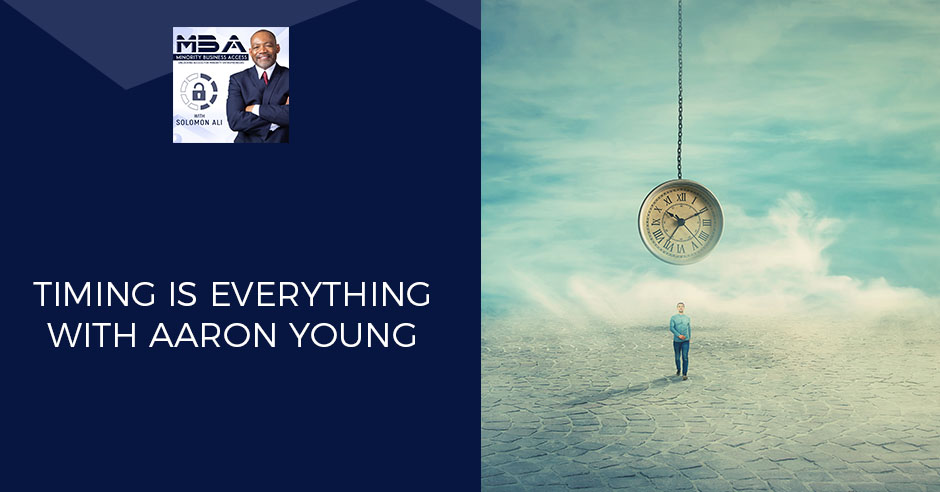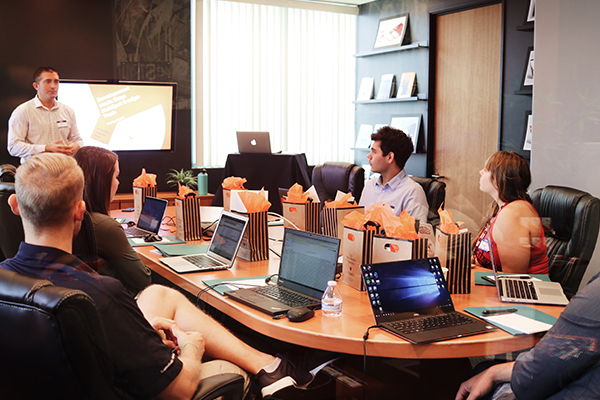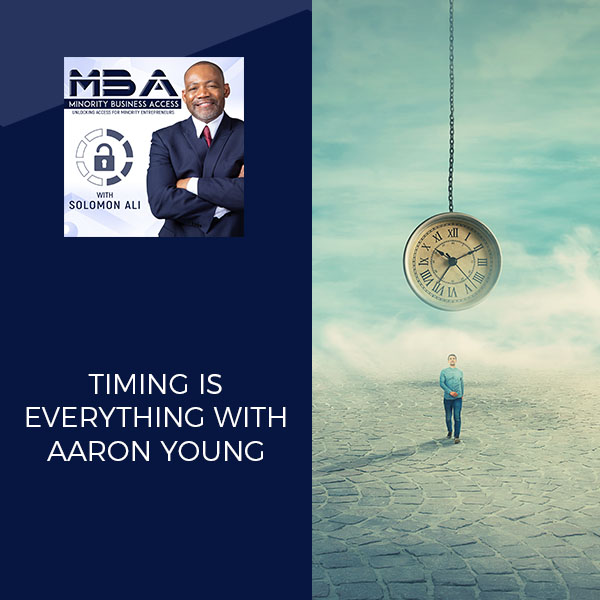
For Laughlin Associates’ CEO, Aaron Young, the timing could not be more perfect. After 50 years of privately advocating for entrepreneurs and business owners, Laughlin Associates is going public. In this episode of Minority Business Access, host Solomon “RC” Ali and Aaron Young discuss the benefits of small business owners having attorneys and accountants on their team, as well as share what Laughlin Associates’ going public will mean for small businesses who are in need of cohesive structure while navigating the uncharted terrain of today’s post-COVID-19 global gig economy.
—
Watch the episode here
Listen to the podcast here
Timing is Everything With Aaron Young
Thank you very much for being here. It is always a pleasure to bring you new content and share information with you from experts in their field and the things that are going on. In this episode, I have with you Aaron Young, who is going to share some of the great things that he’s doing and things that are happening in his industry. He’s taking his company public, which is exciting. Aaron Young, thank you so much for being on the show.
It’s always good to be here with you and an honor to be on the show.
I’m going to ask you some questions. One, you’re taking your company public. What made you decide that you wanted to do that?
The company celebrated its 50th anniversary. It’s been a neat company. We’ve had hundreds of thousands of clients. We realized that in order to do what we think is possible and it’s a timely thing to do for small business owners. We couldn’t do it on our own steam, so we needed to enlist the public instead of it being a privately held company, sell it to the public, bringing that money and be able to throw some fuel on the fire that we want to start.
There’s a big need out there now to help small business owners get not only access to but also cohesive access to legal accounting and financial services and most of them avoid it. A lot of small business owners don’t want to talk to a lawyer. They don’t want to talk to a CPA. They want to do everything in the least expensive way possible. We think that there’s a movement now accelerated by COVID that gives us an opportunity to go out and attack a need in the market, but we needed more capital to do it, so we decided the public route was the way to go.
COVID affected a lot of businesses and things of that nature. My opinion is that we’re going to have a gig economy with gig workers and things of that nature. How will that impact your business or your industry?
Our industry is the resident agent, incorporation and corporate compliance industry. If you’re going to set up a corporation or LLC, you might come to us. We’ve been doing it for several years. There are a bunch of other foundational pieces that all businesses need. Large companies have in-house accounting people. They have in-house legal people and so on, but the vast majority of small companies are 1 or 2 owners. They’re doing everything from their hip pocket. They know how to do what they do, but they don’t really know how to run a business.
There’s a big need out there right now to help small business owners get cohesive access to legal, accounting and financial services.
The thing that was so interesting about the COVID pandemic and many things shutting down was a lot of workers had to figure out other ways to earn an income. We’ve had things like Fiverr and WeWork and groups like that or virtual assistants in the Philippines or India. That was like those video discs. We went from the cassette tapes to those great big things like a big record and it was an interim technology. Things like Fiverr and WeWork were a great idea and continue to be a good idea, but when you’re hiring, you don’t know who you’re working with and so on. It’s been awkward. What’s happening is this idea of outside employees not under your roof, W-2, full benefits and all that stuff. The idea of the young people going to work at the firm or the factory for 30 years, paying off their house and retiring in their local community isn’t the thing anymore.
I think that day is long gone. One of the things I was looking at was since COVID, companies got smarter. They realize they don’t need as many employees working from an office space and that they can work from home. That to me, for your industry, is like, “You’re going to have all of these gig employees or gig sub-contractors that are going to be working for companies that are going to have to start a business. They’re going to need to know how to run a business and going to need some help doing that and being guided through that whole process. Perhaps attorneys and accounting people are not all affordable, but if you’re a company that’s been doing it for years, which you guys are experts and leaders in this industry, how will that impact the growth of your company?
COVID put people out into the virtual world and companies got smarter and they said, “We don’t need all these employees. We don’t need them under a roof. We don’t need them at all,” and that’s unfortunate for a lot of people that lost their jobs. It is shaking out and improving a strengthening of companies themselves, but that leaves all these people. In times past, that might’ve been harder for people getting laid off and they don’t know what to do. I’ve got kids. They don’t see themselves staying in one place and in one job.
The access to high-speed Wi-Fi is everywhere. They can do almost everything from a smartphone or from a laptop. All of a sudden, now these people got shaken out, the younger ones, especially, but some older ones too. The younger ones are now saying, “I can be mobile. I can spend three months working then go to Bali. I can go down to Tulum and sit on the beach with my laptop and I can work a few hours, then I can go explore the jungle.” For us with gray hair, we’re like, “Who would do that? Where’s the security in that? What are you going to do,” but that is what’s happening.
What’s going to happen is the laws around the thing what you’re doing, protecting yourself from the world that you’re engaging with, the tax benefits that are available even to a one-person company, these gig employees can now be their company. They could take gigs from anywhere in the world. They can earn their money. If it’s a corporation, they can be a W-2 employee of their own company. They own it, but they’re also an employee, so they have a pay stub and so on. They can go get a loan, buy a car, rent a house or buy a house. They can do all that and I don’t think they know that now for the most part.

Timing is Everything: 150 years ago, we went from a fully agrarian economy to an industrial economy, and we went into a communication economy. Now we’re into this mobile economy and the faster the internet gets and the more data that can go through it, the more things that can be done.
A big thing that we see in the gig economy is taking millions of people. I’m going to go one step further. This gig economy is global. You’ve got people like Jeff Bezos and also Richard Branson that want to put up these arrays of satellites, free Wi-Fi. Mark Zuckerberg is giving out free phones to third-world countries. These people need to be legally organized in the jurisdiction where they’re working.
Aaron, what you’re saying is, you can hire someone as a gig worker from Africa, but they have to be structured correctly here in the United States.
That may not be the exact correlation, but I guess what I’m saying is what’s happened right now is truly making the global economy come down to the grassroots level.
I want to try to regurgitate what I hear you saying. If I’m the employer, I can put out a whatever and say, “I need someone to do this particular assignment,” anywhere on the globe and they can come in and get that job done for me.
That gig worker who’s here in the United States and can’t find a regular job or got displaced from a job can do the same thing. They can work for Africa, Europe and Hong Kong.
Is it going both ways?
Yes. All of a sudden, you have all these people who are tech-savvy who grew up with a keyboard in their hand. If they have a corporation or an LLC, if they know how to use it, if they learn a few basic business principles, they can be a company of one. They can live the lifestyle they want to. They can get the asset protection that they need as they build some success and wealth. They get all the tax deductions that the big mega-companies get. They can get it all and this is how the economy is changing.
Many years ago, we went from a fully agrarian economy basically to an industrial economy. We went into a communication economy and now we’re into this very mobile economy. The faster the internet gets and the more data that can go through it, the more things that can be done. A brilliant person doesn’t have to be stuck doing what somebody else gave them to do. They can create their own deal.
What’s happening right now is truly making the global economy come down to the grassroots level.
Aaron, everything is so exciting. I’m hearing about what you’re talking about and I’m thinking about COVID and how that has changed the economy and what’s taking place. In your own words, you got the economy changing from what it was. Now, we’re going into post-COVID. What does that look like?
First of all, I believe that a lot of big companies are downsizing. We talked about the young people, which it doesn’t have to be young people doing gig work. It’s going to be all of us, but I think the younger people than me are going to be more involved in the gig economy. The thing that’s interesting about other people who’ve gotten downsized and took their 401(k) or their IRA and self-directed it and started some business, all these small companies are closely held. I’m going to call them microbusinesses with 1, 2, 3, 4, 5 people. They’re very small companies. There is a fundamental dislike amongst virtually every small entrepreneur I’ve ever met. They resist engaging an attorney. They don’t all the way trust them. They don’t trust the billing. It scares them to death.
They want to use TurboTax or Uncle Bob or their niece or somebody to do their taxes because it’s less expensive. Maybe they can fudge a little bit. Many of them may not think they have enough money to look for financial strategy or so on and so forth. I don’t mean buying insurance. I mean, “How can I take the money in the best way to pay the least amount of taxes and get the most bang for my buck with what I’ve got?” To the point, we want to build the most customer-centric business, high touch with the customer, high-tech in the back that does legal accounting and financial tasks. We’re not a law firm. We’re not an accounting firm. Not now. We might buy one, but most of those tasks can be done without having to go to $400 or $500 an hour.
What industry are you guys exactly?
Now we’re exactly in the resident agent, incorporation and corporate compliance industry.
It’s because of COVID and now we’re in post-COVID, the economy has changed and you’re going to have all these gigs or gig workers out there. First, your industry is going to grow tremendously because of the millions of people who will not have jobs, who will have to become gig workers. That’s going to create growth in your industry. That’s also going to create huge growth in your company. That’s phenomenal.

Timing is Everything: Right now, a lot of entrepreneurs, go to their lawyer and ask a question and then go ask the same question to their CPA. You’re going to get different goals.
That’s the hope. I love Disney World. I was almost against Disney World because I was so loyal to Disneyland, but then I went to Disney World. When you go fly to Orlando or you drive past, there is a strip mall and a Ferris wheel and putt-putt golf. There are all these things to distract you and that’s like a lot of things in business. Here’s somebody’s idea, somebody’s conference, what some lawyer said and here’s a podcast I heard. All this disparate stuff. You then pull through the gates of Disney World and everything changes. Everything looks cohesive. If you want to go to a theme park and ride roller coasters, go to a water park and go down a slide, go golfing, go to a bowling alley or movie theater or a restaurant or whatever, it’s not only all there. It all feels connected. It’s cohesive. You know you’re at Disney.
There’s nothing that I’ve ever found for business owners where they can come and work with a group of companies that specialize in legal issues, accounting, bookkeeping, tax resolution, incorporation, compliance and insurance and so on. That company is able to move that customer no matter where they come into the universe like Disney. Once you get there, there’s no reason to leave. The trick is, as we acquire other companies that fit its pattern, then to have the leaders together and say, “How do we process to make it easy for the customer?”
We go to the customer. The customer doesn’t have to come to us. How do we organize the information that we have with these customers so we can anticipate needs so that we cannot ever be pushing them to anything? We are helping them find the mile markers where it’s time to, “Now we add this. Now we do that. Now we look at this. Now we take it up a level. Now we add a second company.” I think we can do that and there’s a hunger amongst the small and medium-sized business owners.
That’s one person up to hundreds of employees, but they’re not a big enterprise company. There is a hunger amongst that leadership to have a go-to place where they can get everything done and people are talking to each other. Now, a lot of entrepreneurs go to your lawyer and ask a question, then ask the same question to the CPA. You’re going to get different goals. What do you do then? You go to your financial advisor and they say, “No, don’t do that.” That leaves that person flapping in the wind but what I want to do is to bring those people together and make a cohesive plan to help that business owner. The owner focuses on their business and this group focuses on their asset protection and their wealth growth.
One of the exciting things about your company, what it does for companies and what it truly means, in my opinion, is this. It helps companies to stay compliant, first and foremost. It helps companies to keep all their records and everything in order, so if they’re looking to access capital, they don’t have to worry about, “Do I have my paperwork in order?” Everything’s there. It’s already in order. That’s a benefit. People now coming into this new gig economy are going to be faced with, “I may have been a great mechanic, but now I have to be my own boss.”
There is a fundamental dislike amongst virtually every small entrepreneur. They resist engaging an attorney. They don’t trust them.
They’re going to have to learn different skillsets. That’s where an established company like yours with many years of experience can help guide and direct you in your business endeavor. They will let you do what you do best while they help you to focus on what you don’t do or don’t know and direct that. As a public company, what I hear you saying is, “We’re willing to share the growth opportunity as we scale and grow.” New stakeholders and things of that nature can come in and invest in Aaron’s company and become stakeholders as they continue to do. I think that’s phenomenal.
I want to say that this industry isn’t a flashy industry. This doesn’t have movie stars. This isn’t some new cure for cancer or something. It’s not the flashy stuff, but all the flashy stuff has to be built on this foundation. That means everybody out there that wants to be in business needs somebody like us to get them organized and to help them start, grow, profit and protect what they’re doing. I believe that if we can realize this dream, this Disney World dream, and we’ve got the team together to do it. I believe this will disrupt a whole bunch of industries. We can do it.
One of the exciting things is you guys seem to be at the right place at the right time. That sounds so cliché, but you waited many years to do this. It’s like, “Wow,” because of COVID and the change in our whole economy, climate and society. You guys are in a position right to experience a tremendous amount of growth.
We believe so. The more business owners I talked to and we have thousands of business owner clients now and other people as I travel around speaking and teach people about business, they like it. They’re like, “When can we get in? What can we do?” We’re here in Denver while we’re doing this. I’ve had multiple people up and say, “I understand that you’re doing this. How could my company fit into your vision?” Maybe it’s an accounting practice or a financial strategy practice or something. They’re coming up and going, “How could I be part of it?” Not only be a client, how could they be in it?
Basically, what you’re talking about is your company definitely is poised to grow triple-digit growth within the industry that is going to be developed by you.
It’s going to be new. I don’t know anybody else’s doing what we’re talking about doing. It’ll be a great opportunity for business owners. There will be a great opportunity for investors. People always say, “What’s your passion? What’s your purpose? What’s your thing?” I kept trying to think of what it was. I thought about all my life experience, all the companies that I’ve started and all the things I’ve done. Almost all of it has been working with business owners.

Timing is Everything: Everybody out there that wants to be in business needs somebody like us to get them organized and then to help them start and grow and profit and protect what they’re doing.
When I started my first cellular phone company in 1986, believe me, it was only lawyers, stockbrokers and doctors who buy. I was working with owners. Nobody could afford $0.40 a minute and a $3,000 phone. It has morphed ever since then. I decided that the best way I can make a ripple into the world is to help more businesses stay in business for more years, making more money. I think this is the way to do it. When they stay in business, I make more money. They give money to charity. They contribute to the Little League team. They hire more people and pay for health insurance. They do all these things and that’s how communities grow. That’s the ripple effect we can make in the world.
Everyone, I hope this has been a true benefit and a help to you to learn about a new industry, learn about why a CEO will take his company public and what it means to people like you who may have the opportunity to invest in that company in its early stages. That’s where you receive the hugest rewards. When I say rewards, what I’m talking about is the huge gains. That’s how you get the 300%, 500%, 4,000% or 5,000% returns on your money. It’s when you get in the early stages and figure out, “The company is growing. It’s growing within a new industry or creating a new industry. It’s going to be able to grow by triple-digits.”
Not only that, the management has been doing something right for many years. This is a company that’s been around for years. You need to do your homework, do your due diligence, look at the company and take a good look at it. You want to be a part of it. I want to thank you all for reading. It’s been a pleasure talking to you once more. Aaron Young, thank you so very much. We appreciate you coming to the show.
Thanks, Solomon. Anytime.
Important Links
About Aaron Young
 Aaron Young, is a lifelong entrepreneur, trusted advisor to CEOs and business owners and creator of The Unshackled Owner a program for entrepreneurs looking to build a business and not just a glorified job.
Aaron Young, is a lifelong entrepreneur, trusted advisor to CEOs and business owners and creator of The Unshackled Owner a program for entrepreneurs looking to build a business and not just a glorified job.
Aaron is Chairman/CEO of Laughlin Associates, a 44-year-old company that has helped over 100,000 entrepreneurs start, grow and profit from their business. This has given Aaron an ideal vantage point to observe common mistakes and successes in businesses from Main Street to America’s largest yacht broker from medical professionals to manufacturers to investors. For over 34 years, his experience founding, acquiring and directing multi-million dollar businesses as well as working as an officer for a publicly-traded, multi-national, sets him apart from the crowd as a voice of real-world knowledge and authority.
Aaron has made it his life’s work to arm other business owners with success formulas that immediately provide exponential growth and protection.

